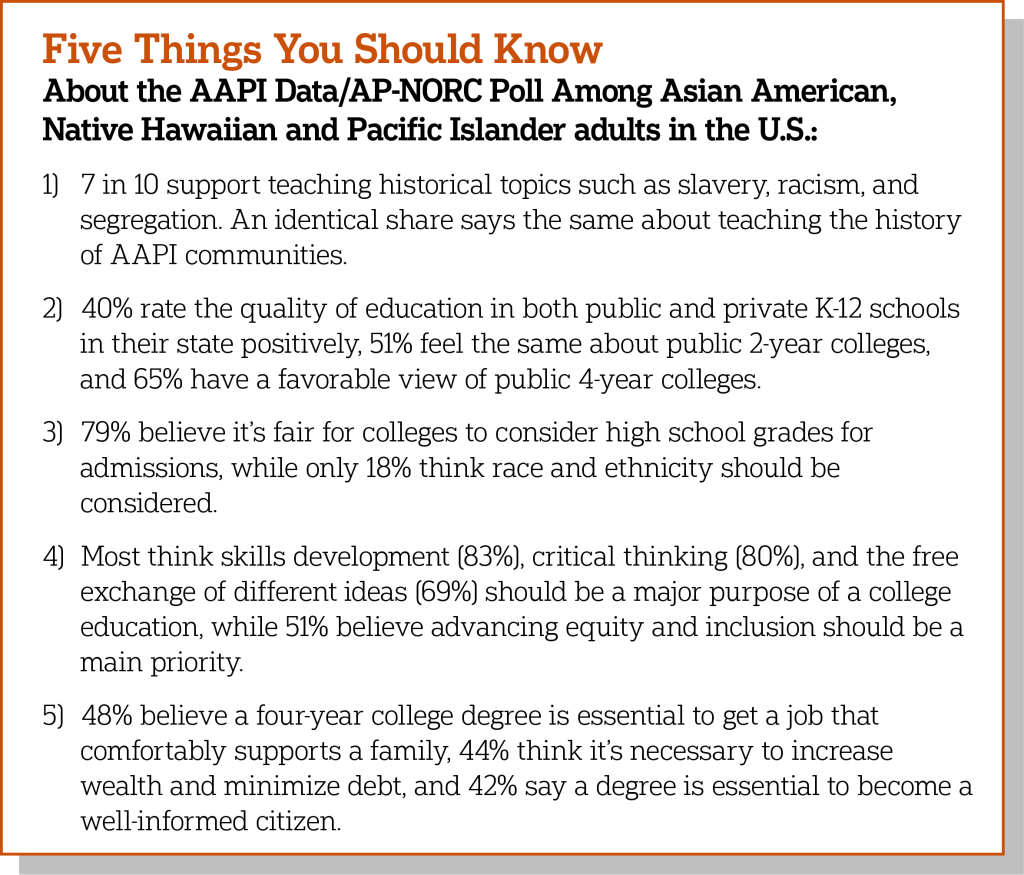
May 29, 2024
As the country grapples with debates about what should be taught in classrooms, a new AAPI Data/AP-NORC survey reveals strong support among Asian American, Native Hawaiian and Pacific Islander (AAPI) adults for teaching historical topics such as slavery, racism, and segregation (71%) along with the history of AAPI communities (71%).
There is less consensus about teaching issues related to sex and sexuality, with 53% in favor and 19% opposed.
Fifty-six percent of AAPI adults oppose individual school boards restricting specific subjects and classroom discussions and 35% feel local school boards have too much influence on curricula. Nearly half believe parents (47%) and teachers (48%) have too little influence on public schools’ curricula.
On school safety, 57% believe mandating mental health counselors is an effective approach to protect children’s safety and well-being. About half consider bullying prevention programs (52%), practicing lockdowns (50%), and employing trained security guards (50%) helpful methods to ensure school safety.
Levels of satisfaction across AAPI communities on school quality are mixed. Four in 10 rate both public and private K-12 schools positively, and about half feel the same about public community colleges or 2-year institutions. Public 4-year colleges and universities receive higher marks with 65% deeming them excellent or good.
Direct engagement with the local school board is low among AAPI communities, as it is with the general public. Just 13% of AAPI adults report they attended a meeting and 18% reached out to a school board member in the last five years.
In terms of future success for children, most AAPI adults (85%) say hard work is a critical component, followed by the amount of time children spend with a parent (79%). These views largely mirror the general population when they were last asked in March 2022, although AAPI adults are more likely to believe that neighborhoods (62% vs. 49%) and parental income (57% vs. 44%) plays a major role in a child’s future success in adulthood.
The education survey was conducted prior to widespread protests on college campuses. Majorities of both AAPI communities and the general population surveyed in September 2023 see teaching critical thinking (80% vs. 76%) and imparting workplace-relevant skills and knowledge (83% vs. 82%) as major purposes of universities. Lower, but similar shares of AAPI adults and the general public believe colleges should foster the free exchange and debate of ideas and values (69% vs. 62%) and advance equity and inclusion (51% vs. 46%) as major purposes for higher education institutions.
Nearly half (48%) of AAPI adults consider a four-year college degree essential for securing a job that comfortably supports a family, although this sentiment drops slightly for its role in wealth accumulation (44%) or citizen engagement (42%). Forty-eight perceive a degree as important, albeit not essential, for facilitating job mobility over the long term.
In terms of financing higher education, roughly half of AAPI adults view state governments (49%) and the federal government (48%) as bearing a large responsibility, while about a third hold individuals (36%) and families (32%) to the same standard.
Roughly 8 in 10 AAPI adults support college admission criteria based on high school grades (79%) and 65% think consideration of standardized test scores is fair. About 4 in 10 believe experiences with hardship or adversity should be considered. However, factors like athletic ability (42%), ability to pay full tuition (48%), or race and ethnicity (53%), are widely perceived as unfair. Additionally, most consider lineage-based considerations to be unfair, such as legacy admissions (69%) or being a first-generation college student (54%).
When it comes to creating a respectful and inclusive environment for students, faculty, and invited speakers from various racial and ethnic backgrounds, AAPI adults are less likely to perceive the environment as equally inclusive for Asian or Pacific Islander students (31%), Black students (32%), or Hispanic or Latino students (30%) than for white students (48%).

The nationwide study was conducted by The AP-NORC Center for Public Affairs Research and AAPI Data from April 8-17, 2024, using the Amplify AAPI Monthly survey drawing from NORC’s Amplify AAPI® Panel designed to be representative of the U.S. Asian American, Native Hawaiian, and Pacific Islander household population. Online and telephone interviews were offered in English, the Chinese dialects of Mandarin and Cantonese, Vietnamese, and Korean with 1,068 Asian American, Native Hawaiian, and Pacific Islanders aged 18 and older living in the United States. The margin of sampling error is +/- 4.7 percentage points.






